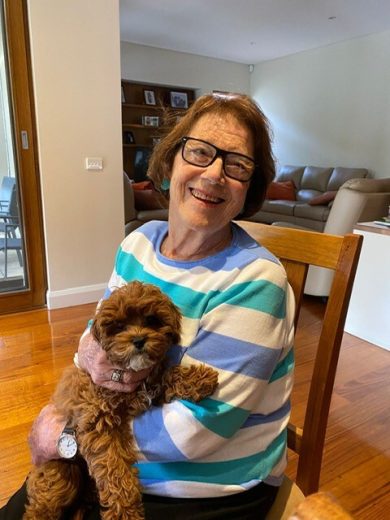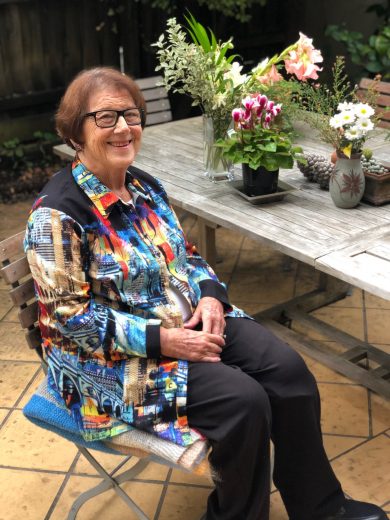- Home
- |
- About us
- |
- News and Events
- |
- Resources
- |
- Contact
- |
- Donate today
- Shop

Each morning I awake with the joy of being alive. Each day I face the same two key challenges, these being complete blindness and a below-the-knee amputation. They have blinked at this poker ‘game of life’, not me.
My sensory challenge is long-standing severe vision loss since undergoing eye surgery at age 17. Despite this impairment, I was able to study and establish a rewarding career as a speech pathologist working mainly with children. Together with my husband we raised a family, on the whole without feeling that I am handicapped.
My sight gradually deteriorated. Soon after cardiac surgery at the age of 40, I suddenly lost most of my remaining sight and was classified as legally blind.
I walk carefully. It is hard to recognise people, distinguish more than large shapes, and maintain my independence. My difficulty with facial recognition has been further exacerbated since 2020 due to the requirement to wear masks.
My physical challenge is that some years ago, my lower left leg had to be surgically removed. Learning the skills to cope as an amputee has been more challenging than dealing with my sight, given that my vision decreased over the years.
Set out below is how my amputation occurred and the way I have dealt with it.
I was approaching 70 when, due to a lack of feeling in my feet and legs and my very poor eyesight, I failed to recognise the severity of an infection that led to severe pain in my leg and spine and eventual collapse. I have no memory of the following two weeks until, in a darkened daze, I heard a voice asking, “Do you understand your leg must come off?” I must have said “yes”.

The next thing I knew, the sun was shining brightly, and I was surrounded by my wonderful husband Lewis, supportive family, and incredible medical staff. Their love and concern helped me to accept the shock of my dramatically changed situation and sort out how to move forward.
Because I had no time to mentally prepare for the amputation, I faced a huge challenge. As I’d never being an athletic person, to learn physical skills at the age of 70 was hard, but I was determined to maintain my independence and avoid being in a wheelchair. Now, some 15 years later, I am proud that I coped with these frustrations.
How is it possible to make the most of every day in my 80s while coping with these physical and sensory handicaps?
I am fitted with a prosthesis from Caulfield Rehabilitation Centre and I benefit from regular physiotherapy.
A wheelie walker helps me maintain my balance and provides seated respite when I am tired.
Unfortunately, I cannot go out as often as I would like. Many friends are no longer able to lift the unwieldy wheelie walker they struggle to manoeuvre it in and out of their car.
Phone ordered taxis are of use as back up, but my blindness means that they are difficult to spot when they come to pick me up when I am away from home.
Vision Australia helps coping with blindness and vision loss. It provides practical advice and emotional support. It also has a centre with easy to use products such as a mobile phone and TV remote control.
I have a carer to help me every morning.
Planning is key. Prior to removing my prosthesis at bedtime, I ensure I am completely organised with those items I may need at arm’s reach. The effect of removing the prosthesis is an immediate reduction in mobility. Imagine the frustration of forgetting to turn off the main bedroom light or feeling thirsty when no water is conveniently nearby. To refit the prosthesis takes time and effort.
Daily exercise is a priority, even if only for short periods.
Maintaining a positive attitude helps. I like to remember the time a hospital staff member described me as “the smiling one”.
My attitude is typified by my favourite song, it being Louis Armstrong's "It’s a Wonderful World".
I am comfortable talking about how I deal with my impairment. Most people are empathetic, occasionally asking, “Can I touch it?” or “Can you take it off so I can see it?”
I am amused when someone says, “Pull the other leg!” to which I like to answer, “Which one?”
I enjoy and value the support of my loving family and friends.
I recognise that others are not as fortunate as me in having outstanding tender love and care.
A positive side-effect of my disabilities is that my grandchildren have learned to be caring, understanding and helpful. Not only to me, but also to others. This is evident from their volunteer work with the elderly, and with young people who live with disabilities.
Looking to the future, my will is strong. I can continue to make the most of living independently and enjoying all that life has to offer.
Definitions
These definitions, adapted from the ACC Institute of Human Services, are helpful for explaining my world:
An impairment is a malformation or malfunction with an organ or structure of the body, such as losing a limb.
A physical disability is a functional limitation resulting from the impairment such as the inability to walk.
A physical handicap is the experience of a disadvantage in filling a normal role due to the functional limitation caused by the impairment such as not being able to climb stairs.
Keep up to date with our latest news, events and information